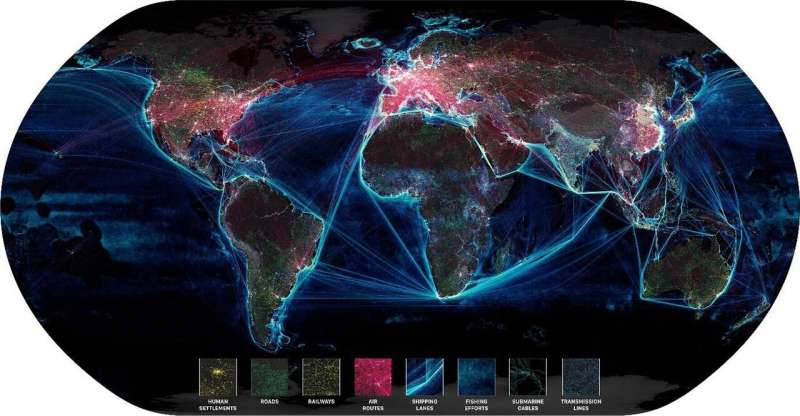Fig. 1 The home of humankind. Our economies, societies, and civilizations are embedded in the Biosphere, the thin layer of life on planet Earth. There is a dynamic interplay between the living biosphere and the broader Earth system, with the atmosphere, the hydrosphere, the lithosphere, the cryosphere, and the climate system. Humans have become a major force in shaping this interplay.
Artwork by J. Lokrantz, Azote From: Our future in the Anthropocene biosphere
Human actions are threatening the resilience and stability of Earth's biosphere—the wafer-thin veil around Earth where life thrives. This has profound implications for the development of civilization, say an international group of researchers in a report published for the first Nobel Prize Summit, a digital gathering to be held in April to discuss the state of the planet in the wake of the COVID-19 pandemic.
"Humanity is now the dominant force of change on planet Earth," according to the analysis published in Ambio, a journal of the Royal Swedish Academy of Sciences.
"The risks we are taking are astounding," says co-author Johan Rockström, director of the Potsdam Institute for Climate Impact Research and co-author of the analysis. "We are at the dawn of what must be a transformative decade. The Nobel Prize Summit is really the scientific community shouting "wake up!"
"In a single human lifetime, largely since the 1950s, we have grossly simplified the biosphere, a system that has evolved over 3.8 billion years. Now, just a few plants and animals dominate the land and oceans," says lead author Carl Folke, director of the Beijer Institute of Ecological Economics and chair of the Stockholm Resilience Centre at Stockholm University. "Our actions are making the biosphere more fragile, less resilient and more prone to shocks than before. Humanity must become effective planetary stewards. About 96% of all mammals by weight are us, H. Sapiens, and our livestock, or cattle, sheep and pigs. Just 4% are wild mammals like elephants, buffalo or dolphins."
The report summarizes recent research on the scale of human activity: "Seventy-five percent of Earth's ice-free land is directly altered as a result of human activity, with nearly 90% of terrestrial net primary production and 80% of global tree cover under direct human influence."
Rising greenhouse gas emissions means that "within the coming 50 years, one to 3 billion people are projected to experience living conditions that are outside of the climate conditions that have served civilizations well over the past 6,000 years," depending on how population and climate scenarios play out, according to the report's summary.
Co-author Line Gordon, director of the Stockholm Resilience Centre says, "This is a decisive decade for humanity. In this decade we must bend the curves of greenhouse gas emissions and shocking biodiversity loss. This means transforming what we eat and how we farm it, among many other transformations."

A snapshot of the interconnected globalized world, showing the human influence in terms of settlements, roads, railways, air routes, shipping lanes, fishing efforts, submarine cables, and transmission lines
(Credit: Globaïa)
Instead of listing well-known solutions such as wind power, solar or plant-based diets, the researchers tackle the barriers to progress. Two of the biggest barriers are unsustainable levels of inequality and technology that undermines societal goals. New narratives that reconnect development to the biosphere are in demand, say the authors.
The report concludes that inequality and environmental challenges are deeply linked. Reducing inequality will increase trust within societies. Trust is essential for governments to make long-term decisions, the report argues. Social media and access to reliable knowledge is also highlighted as a barrier to progress.
The risks of the next generation of technologies are brought into focus throughout the report.
Co-author Victor Galaz, the deputy director of the Stockholm Resilience Centre, says, "As the pressure of human activities accelerates on Earth, so, too, does the hope that technologies such as artificial intelligence will be able to help us deal with dangerous climate and environmental change. That will only happen, however, if we act forcefully in ways that redirects the direction of technological change towards planetary stewardship and responsible innovation."
The first Nobel Prize Summit, Our Planet, Our Future, a three-day digital event open to all, has been convened to provide a platform for scientists to discuss the state of the planet at a critical juncture for humanity. It will explore two urgent questions:
What can we learn from the global pandemic to reduce risk of future shocks? And what can be achieved in this decade to put the world on a path to a more sustainable, more prosperous future for all of humanity?
"The global pandemic is an Anthropocene phenomena. It has been caused by our intertwined relationship with nature and our hyper-connectivity. But the pandemic crisis opens up the possibility to change the course of history. It is a moment to accelerate action to stabilize Earth for future generations," says Folke.
Nobel laureates will be joined by guests including Al Gore, the Dalai Lama, Anthony Fauci, Johan Rockström and youth activist Xiye Bastida. The summit is based around three themes: the biosphere (climate and biodiversity loss), rising inequality and the technological revolution. The paper is published in the April 2021 issue of Ambio a journal of the Royal Swedish Academy of Sciences (published 22 March).
Recommend this post and follow The birth of modern Man
https://disqus.com/home/forum/lifeofearth/


No comments:
Post a Comment
Stick to the subject, NO religion, or Party politics